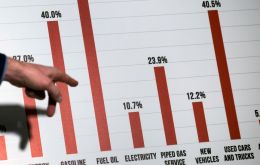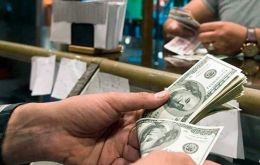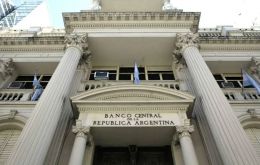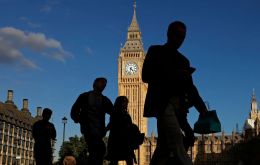MercoPress. South Atlantic News Agency
Tag: Inflation
-
Friday, May 12th 2023 - 10:30 UTC
Despite fears of recession and bank failures, US economy manages 4,9% inflation and unemployment stands at 3,4%

Inflation in the US has fallen to 4,9%, in the twelve months to April, according to official figures. That was down from 5% in March and marks the tenth month in a row that price rises have slowed.
-
Saturday, May 6th 2023 - 10:54 UTC
Central Bank report corrects Argentina's inflation projections upwards

According to the Argentine Central Bank's (BCRA) Market Expectations Survey (Relevamiento de Expectativas de Mercado - REM) report published Friday, the panel of economists issuing that document has made an upward correction to their inflation forecasts for 2023, placing it at 126.4%, or 16.4 percentage points above April's projections, while last month's Consumer Price Index (CPI) is believed to be of 7.5%. The National Institute of Statistics and Census (Indec) will release the official data on May 12.
-
Tuesday, April 25th 2023 - 12:57 UTC
“Blue” dollar hits AR$ 462 in Argentina

The “blue” (a euphemism for “black market”) dollar went up another AR$S 20 Monday to close at AR$ 462 and somehow match inflation in other items of the country's economy, which it was lagging.
-
Monday, April 24th 2023 - 17:02 UTC
Argentine inflation has the country printing money in France, Malta, Spain, China and Brazil

The explosive inflation situation in chaotic Argentina, close to 120% in twelve months, with the CPI at 7,7% in March ( and roaring during the three weeks of April) is showing that the country is incapable of supplying the necessary demand for bills and thus must appeal to the printing in foreign mint houses, of billions of Argentine bills.
-
Friday, April 21st 2023 - 10:08 UTC
Except for Argentina, the ECLAC study highlights that in the region “inflationary pressures have slowed down”

According to an ECLAC (Economic Commission for Latin America and the Caribbean: an organization of the United Nations that supports trade and economic growth in Latin America and the Caribbean) study released Thursday, Latin America's growth for the year 20023 was forecast to be averaging 1.2%.
-
Thursday, April 20th 2023 - 10:23 UTC
How far up did the US dollar go Wednesday against the Argentine peso?

Argentine Economy Minister Sergio Massa seems unable to find a way out of the country's current crisis. In this scenario, the “blue” dollar (a euphemism for “black market”) rose five more pesos Wednesday to close at AR$ 423 as the Central Bank (BCRA) ended with a negative balance of US$197 million, this bringing a streak of six positive rounds to an end. The country risk remained at 2,474 basis points, according to JP Morgan's index.
-
Wednesday, April 19th 2023 - 10:44 UTC
What triggered a new “blue” dollar rise in Argentina?

Rumors about Economy Minister Sergio Massa's possible resignation, the “blue” (a euphemism for “black market”) US dollar rose again Tuesday against the Argentine peso. President Alberto Fernández was reported to have a name to replace Massa: that of his Chief Advisor Antonio Aracre, who turned in his resignation Tuesday afternoon in a move to appease the markets.
-
Wednesday, April 19th 2023 - 10:19 UTC
UK twelve month inflation in March eases to 10,1%, but Food remains strong having risen 19,1%

According to the Office for National Statistics, the consumer price inflation rate in the United Kingdom eased to 10.1% year-on-year in March 2023, down from 10.4% the month before.
-
Saturday, April 15th 2023 - 10:05 UTC
Argentina: Inflation in March reaches 7.7%

Inflation for the month of March was reported to have reached 7.7% for a 104.3% interannual and 21.7% in the first quarter of 2023, the National Institute of Statistics and Censuses (Indec) said Friday. In February, the Consumer Price Index (CPI) rose by 6.6%.
-
Wednesday, April 12th 2023 - 09:05 UTC
Brazilian inflation decelerates in March

Brazil's National Wide Consumer Price Index (IPCA), which measures the country's official inflation, reached 0.71% in March, decelerating in relation to February, when it was 0.84%, and reaching the lowest level since January 2021, it was announced Tuesday.
